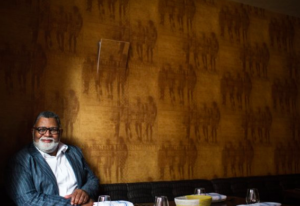
This one-time small-town boy from Spartanburg, South Carolina, has some very clear ideas about the food he serves at his now sizzling-hot restaurant in Harlem. And when Smalls speaks, the whole world is now leaning in to listen after one of the most influential magazines in the country, Esquire Magazine, named The Cecil as 2014’s Best Restaurant in America.
Yes, the best restaurant in the entirety of the 50 states. Serving food that should not be called “soul food.”
“The Cecil is an exotic concept and an idea,” said Smalls, chef and co-owner—with business mogul Dick Parsons—of The Cecil. “It’s something that can’t be dismissed. Often times the world likes to simply say anytime a Black person steps into a kitchen that they’re making soul food. I have nothing against soul food. I just think young African-Americans should have the opportunity to find themselves without being under the umbrella of having their food called soul food because they are Black.”
In fact, don’t even call it food. As Smalls puts it, his delicacies should be considered as more of a conversation.
“At The Cecil in Harlem I am creating my interpretation of an edible conversation of the food of the African diaspora,” said Smalls.
Nestled in what used to be The Cecil Hotel, the restaurant offers a new and unique spin on fusion cooking.
“What I have done is created a celebration of the food of the African diaspora, which includes a lot of the singular disciplines that other restaurants probably build their foundation on, soul food or southern food or African food or Asian food,” explained Smalls. “Essentially, I have studied some of the historic tracks of African migrating people throughout the globe as a result of forced slavery and I have studied their contributions on the culinary landscape in all of the countries that they inhabited. Everywhere Africans were sold as slaves they were the workforce. So I studied those relationships, and what I call organic, authentic fusion cooking. The first fusion cooking, really, and I then gave my interpretation of what all of that would be if it were a culinary discipline.”
The Cecil is the only place in New York where you can have authentic Asian food resting next to African-inspired delicacies all on one plate. But the journey to The Cecil hasn’t necessarily been straight and narrow for the opera-singing chef. He opened two restaurants prior to the Harlem gem because, well, food was just in his blood.
“When you grow up in a small town you get up from the table and you’re already thinking about the next meal. Your life revolves around eating, playing and school,” Smalls said. “There wasn’t a lot of night life so everything was done with family. The big thing was to go to a church fish fry or a picnic or after church go and get some ice cream or something, but it was very simple. The world seemed to conspire to make sure that families uniquely were interwoven. You all had this activity where it was essentially ‘let’s get together over food.’ Food was power for people. It was currency. Food was magical.”
So, food was never a question. The real issue was what he was going to do with it. A lively spirit devoted to following passions and squeezing every drop out of the human experience, Smalls knew he wanted to use his gift to take people on a journey. So in 1994, he decided to open his first restaurant, Cafe Beulah.
“The point was to make my living room public. I had to get people out of my house and someone else needed to pay for dinner,” the owner joked. “I mean it was exhausting and I was going broke. I knew I wanted to be a host. I made that decision. I had sung a lot throughout America and Europe. I had been on Broadway. We won a Tony Award and a Grammy for my recording of ‘Porgy and Bess.’ So I’d seen a lot of things, done a lot of things and I knew in that moment in the early 90s that I wanted a different kind of stage. And I basically swapped the operatic stage for the culinary stage. I needed another playground and I felt very strongly that I wanted to be a restaurateur. That’s what was calling me, quite literally I needed to change the conversation.”
With the restaurant’s recent awards and accolades, The Cecil and Alexander Smalls have not only changed the conversation but started a whole new dialogue entirely.
No longer are reporters clamoring to put Smalls in a box by calling his food “finger lickin’ good,” or “sweet as molasses” or any other kind of that “Jim Crow bullsh*t” as Smalls so quaintly puts it. Now people are talking about his food for the way it opens their eyes and the journey it takes them on.
“The food was the most thrillingly unique we tasted this year, primed and loaded with the flavors of the African diaspora—that trail of taste that moved from West Africa to India, the Caribbean to America to China, and then back again,” Josh Ozersky of Esquire wrote. “But more remarkably, the Cecil has made a community restaurant in one of the most polarized places on earth.”
For most people winning a Tony, traveling the world, co-owning jazz venue and restaurant, Minton’s in Harlem, and having your restaurant be named the best in the nation would be enough, but Smalls clearly isn’t most people. So what’s next for the man who seems to have done it all?
As he simply puts it, “The world.”


